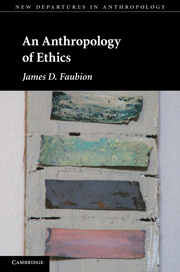17 results
21 - On Ethical Pedagogies
- from Part III - Media and Modes of Ethical Practice
-
-
- Book:
- The Cambridge Handbook for the Anthropology of Ethics
- Published online:
- 11 May 2023
- Print publication:
- 25 May 2023, pp 536-558
-
- Chapter
- Export citation
Dimitris Papanikolaou, «Σαν κ’ εμένα καμωμένοι»: Ο ομοφυλόφιλος Καβάφης και η ποιητική της σεξουαλικότητας. Athens: Patakis, 2014. Pp. 1–358.
-
- Journal:
- Byzantine and Modern Greek Studies / Volume 40 / Issue 1 / April 2016
- Published online by Cambridge University Press:
- 04 April 2016, pp. 182-183
- Print publication:
- April 2016
-
- Article
- Export citation
Acknowledgments
-
- Book:
- An Anthropology of Ethics
- Published online:
- 05 June 2012
- Print publication:
- 14 April 2011, pp x-x
-
- Chapter
- Export citation
Index
-
- Book:
- An Anthropology of Ethics
- Published online:
- 05 June 2012
- Print publication:
- 14 April 2011, pp 295-306
-
- Chapter
- Export citation
4 - An ethics of composure
-
- Book:
- An Anthropology of Ethics
- Published online:
- 05 June 2012
- Print publication:
- 14 April 2011, pp 119-202
-
- Chapter
- Export citation
Part I - An anthropology of ethics
-
- Book:
- An Anthropology of Ethics
- Published online:
- 05 June 2012
- Print publication:
- 14 April 2011, pp 1-2
-
- Chapter
- Export citation
References
-
- Book:
- An Anthropology of Ethics
- Published online:
- 05 June 2012
- Print publication:
- 14 April 2011, pp 277-294
-
- Chapter
- Export citation
Concluding remarks: for programmatic inquiries
-
- Book:
- An Anthropology of Ethics
- Published online:
- 05 June 2012
- Print publication:
- 14 April 2011, pp 268-276
-
- Chapter
- Export citation
Contents
-
- Book:
- An Anthropology of Ethics
- Published online:
- 05 June 2012
- Print publication:
- 14 April 2011, pp ix-ix
-
- Chapter
- Export citation
3 - Ethical others
-
- Book:
- An Anthropology of Ethics
- Published online:
- 05 June 2012
- Print publication:
- 14 April 2011, pp 71-116
-
- Chapter
- Export citation

An Anthropology of Ethics
-
- Published online:
- 05 June 2012
- Print publication:
- 14 April 2011
5 - An ethics of reckoning
-
- Book:
- An Anthropology of Ethics
- Published online:
- 05 June 2012
- Print publication:
- 14 April 2011, pp 203-267
-
- Chapter
- Export citation
1 - Precedents, parameters, potentials
-
- Book:
- An Anthropology of Ethics
- Published online:
- 05 June 2012
- Print publication:
- 14 April 2011, pp 3-24
-
- Chapter
- Export citation
Part II - Fieldwork in ethics
-
- Book:
- An Anthropology of Ethics
- Published online:
- 05 June 2012
- Print publication:
- 14 April 2011, pp 117-118
-
- Chapter
- Export citation
2 - Foucault in Athens
-
- Book:
- An Anthropology of Ethics
- Published online:
- 05 June 2012
- Print publication:
- 14 April 2011, pp 25-70
-
- Chapter
- Export citation
Frontmatter
-
- Book:
- An Anthropology of Ethics
- Published online:
- 05 June 2012
- Print publication:
- 14 April 2011, pp i-viii
-
- Chapter
- Export citation
Kinship is Dead. Long Live Kinship. A Review Article
-
- Journal:
- Comparative Studies in Society and History / Volume 38 / Issue 1 / January 1996
- Published online by Cambridge University Press:
- 03 June 2009, pp. 67-91
-
- Article
- Export citation



